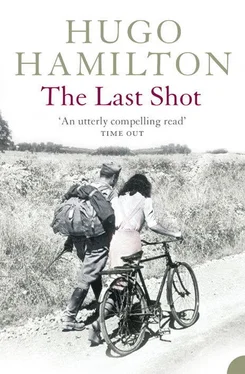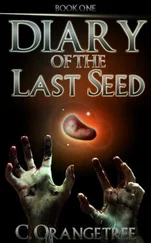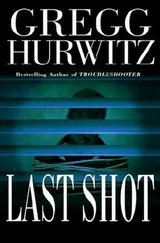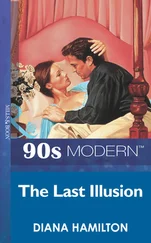They became separated. Bertha was taken into one barracks while Franz was taken in another direction. ‘Say nothing,’ she kept repeating to herself. They were made to answer for themselves. Names, addresses, war records. Each of them had to fill in a questionnaire, a list of National Socialist organizations to which they may have belonged. She had belonged to only one of them, the last on the sheet, an insignificant NS trade union which was compulsory for those employed in the state service. It felt like the final judgement day, Bertha thought to herself. She was nervous. Nervous, because for the first time in her life she could not be entirely honest. She was hiding something. It robbed her of confidence, even though she liked the Americans.
The officer behind the desk asked her where they had disarmed. She said, ‘Eger.’ There were no more questions and she was allowed to travel on. She found the Americans very good-natured and humorous. They wished her good luck. She tried out a number of English phrases which she had learned at school.
She had to wait a while until they also released Franz Kern. He had been asked where they got the bicycles. And what took them so long in getting back from Eger. But once his identity had been verified, he was allowed to move on. They were cleared.
From then on, Bertha and Franz were struck by the sight of the wrecked city ahead of them. Neither of them wanted to go any further. They wanted to head out, back into the country. They sat down at the side of the road and talked. Franz wanted to turn around and head straight for Hamburg.
‘It will be a lot simpler,’ he said. ‘Then we won’t have to explain. And we won’t have to see what happened here. We won’t get involved.’
He was afraid of what lay in front of him. He was afraid to look for his wife or his mother.
‘But you must go and talk to them,’ Bertha said. ‘It is terribly unfair if you don’t. You can’t let them suffer, not knowing where you are. You’re here now, you have to see them.’
They cycled a little, as far as the streets were clear. They dismounted when they came into streets where the piles of rubble on both sides had left only a narrow path in the middle. Few of the houses still had their roofs on. Many of the three- or four-storey houses were reduced to the height of garden walls. Some of the streets were impassable, with large craters. Everywhere, people were scrambling over the ruins, searching for possessions or relatives.
Franz became more worried as he moved on. He also became more eager. They hurried through the torn city to get to the street where he had lived with his wife Monica and his mother.
The house was gone completely. So were the houses next door on either side. He made his way across the mound of bricks, unable to believe that this was once the place where he lived since he was a child, and since he got married. There was nothing left. He went to the house of his wife’s mother and found it had been burned out. None of the floorboards were left. It was black. He assumed the worst and once again felt like leaving Nuremberg for ever.
But Bertha insisted that he had to be sure. He had to look and make inquiries. They asked some of the people in the street what had happened and where all the people had gone to. Some of them were in the country. Many of them had died during the bombing. Some of the survivors were sheltering in camps on the outskirts of the city.
Bertha and Franz found a place to stay for the night. It was a place on the floor in a building among all the ruins which had been left totally intact. The house was packed with people and families. They slept in a room with twenty others. Franz was worried about the bicycles, which they had to leave along the stairs of the cellar where other families were asleep. They slept soundly under Bertha’s coat.
The following morning they found the bicycles where they had left them and went through the streets once more making inquiries. They went back to the street where Franz had lived, hoping that if Monica was alive, she would come back there too. Eventually, Franz met a neighbour who told him where his wife was staying.
Bertha and Franz talked about what they would say to her. He would give her the news slowly. She would realize that it was over. Monica could start a new life on her own.
They hurried over there. Both of them had become excited at the news of finding her-alive. At the door of an old apartment block which was half standing, up to the second floor, they asked one of the older children standing around for Monica Kern. It was the first time it really dawned on Bertha that they had been looking for his wife. It was when he announced her name that she stood back and prepared herself for the reality.
Monica came running through the courtyard. She was crying long before she reached Franz. She ran to him and threw her arms around him. She couldn’t control the shock of her joy. She held on to him and repeated his name. Children who had been playing around in the courtyard all congregated shyly in the arch to watch, some of them perhaps wishing it was their own father.
Monica’s tears were streaming. She stood back and looked at Franz. She pulled up her apron and wiped her tears so that she could see him properly.
‘I can’t believe it,’ she said, clapping her hands together. ‘They told me that a man was looking for me at the door. Franz, Franz, Franz…Thank God you’re back.’
She embraced him again. Franz turned her gently towards Bertha and introduced her.
‘Monica, this is Bertha Sommer who was with us in Laun. We came back on the bikes together.’
Monica stepped towards Bertha and embraced her.
‘Thank you for bringing Franz back to us. I am so grateful. I still can’t believe it. We’ve heard nothing for weeks, months now.’ She pulled them both by the arms. ‘Now, come on in. I’m sure you’re both starving. And exhausted. You’ve come a long way.’
She told one the older boys in the yard to take in the bicycles and put them in the cellar. Then she led Bertha and Franz up the stairs to a small room. There were four other women in the room. Monica’s mother, who was very old now. Another elderly aunt and two younger women, one of them married, as Monica explained, and still waiting for her husband. They had all been staying together in the one room.
‘Our house is gone now,’ Monica said quietly. ‘Luckily, your mother got away to the country before the bombing started.’
‘I know, I heard from the neighbours.’
Monica had an extraordinary enthusiasm and ability to turn the mood. Everyone had enthusiasm. It was all that was left. She couldn’t stop herself looking at Franz and smiling.
‘What you must have gone through,’ she said. ‘You must tell me everything. But first of all, you must have a good meal. We have a lovely lentil Eintopfall ready for you…
‘Bertha, do you wish to use the bathroom first? We still have a tiny piece of soap. You can have it.’
Monica showed Bertha to the bathroom on the landing. The entire plaster had come down from the ceiling. Bertha could look up at the evening sky and at the side wall of the building, which showed the remains of wallpaper and former homes. The bathroom had been arranged very neatly. There were flowers beside the bath. And towels hanging from a rail. The water had been brought up in buckets and basins, collected that way from the rain.
Bertha washed slowly. It was a deep luxury. Even the feeling of being inside a house with a private bathroom gave her a sense of home. She knew there were so many small things to enjoy in this world, now that the war was over. Water made her happy. She washed her feet.
Bertha wondered when Franz was going to give Monica the news of their intentions to go to America. Perhaps he would just leave a note. Perhaps he was already telling her now.
Читать дальше
Конец ознакомительного отрывка
Купить книгу












